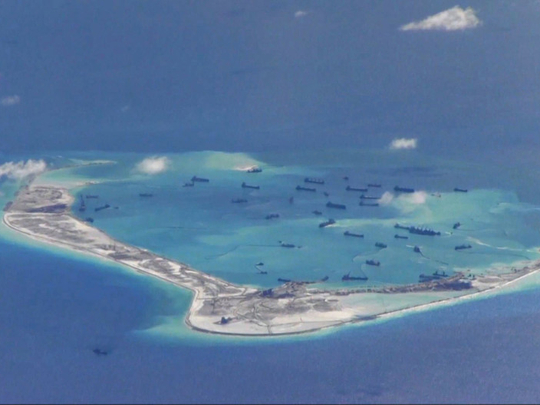
Singapore: It was an unexpectedly direct exchange: With nearly every significant Asian defence official gathered in a single room, a senior Chinese military officer defended his country’s island-building spree in the South China Sea and rebuked US Defense Secretary Ashton B. Carter for saying it threatened the region’s stability.
If anything, “the region has been peaceful and stable just because of China’s great restraint,” said Senior Col. Zhou Bo, the Chinese officer.
Yet a few moments later, away from the crowd and cameras, Zhou’s defiant tone gave way to a seemingly more subtle appreciation of the complex relationship that binds the United States and China together and, at the same time, pushes them apart. The speech by Carter that prompted his comments had “balance,” Zhou said in a brief interview. “We do not disagree on all things,” he added, before rushing off to huddle with fellow Chinese officers at the conference.
On Saturday, Carter and other US officials sharply condemned the artificial island-building, but provided no details on what steps the U.S. may take to press China into diplomatic talks.
Out of step with rules
Carter said China’s land reclamation was out of step with international rules, and that turning underwater land into airfields would not expand its sovereignty. He and others said the U.S. opposes “any further militarization” of the disputed lands. That was a reference to two large motorized artillery vehicles that officials said China had placed on one of the artificial islands.
Chinese officials, in public statements and a private meeting yesterday, defended the construction and slammed the U.S. for interfering.
Chinese Foreign Ministry spokeswoman Hua Chunying said the U.S. was “making absurd remarks about China’s long-established sovereignty and rights, stirring up trouble and slinging accusations regarding China’s appropriate and rational construction activities on its islands. China resolutely opposes this.”
After a week of public rancor over China’s rush to build artificial islands on reefs, rocks and atolls in the disputed waters of the South China Sea, the first full day of the Shangri-La Dialogue, an annual security meeting in Singapore that attracts almost every major and minor player in Asia, gave both sides the chance to lower the temperature.
Although Carter did not hold any formal meetings with Chinese officials, lower-ranking U.S. officials did, and it was apparent that they effectively agreed to disagree on what constitutes sovereign Chinese territory for the time being.
The dispute over the South China Sea has festered for decades with China, Vietnam, the Philippines and a handful of other countries all making overlapping claims to a stretch of ocean rich with natural gas and other resources.
Escalation
While this issue simmered in the background for a long time, disputes have escalated in recent years, most notably when China placed an oil rig near Vietnam last year, but also with skirmishes between naval forces and fishing boats from the various claimants.
Those tensions have heightened as the scope of the Chinese building spree became apparent - U.S. officials say 2,000 acres of land were added in the past 18 months - and a pair of mechanized artillery pieces were briefly spotted on two of the islands, raising fears that China was moving to back up its claims to the new islands with military force.
Chinese forces also this month ordered a U.S. surveillance plane to leave the skies over Fiery Cross Reef, where China has built an island with a landing strip. The U.S. aircraft did not comply.
Then last week China released a document outlining a strategic vision for its navy to project force beyond its coastal waters into the open oceans. Western officials said the release appeared timed to challenge participants at the conference.
Other countries have also built outposts in the South China Sea. But the construction was done before 2002, when China and nine Southeast Asian nations signed a nonbinding agreement to “exercise self-restraint” and refrain from trying to inhabit any land features that were uninhabited at that time. And the pre-2002 construction was never done at the pace and on the scale of China’s recent land reclamation efforts.
Carter, whose speech opened the day, reiterated a call he made earlier in the week for China to halt the construction, saying that U.S. warships and military aircraft would continue to operate in the area, which the United States still considered to be international waters, not Chinese territory. He also listed numerous weaponry that the United States could bring to bear in Asia - though he did not directly link any of it to China - and unveiled a new U.S. effort to help China’s neighbors build up their naval capabilities.
But he balanced his tough talk with entreaties for China to work with its neighbors and the United States to ensure stability in the region, saying that through cooperation “everybody wins.”
Working for peace
He also sought to assuage Chinese fears that the United States was simply using the dispute over the sea to keep China in check. The United States expected countries like China to broaden the scope of their interests as they grew more powerful, and it was ready to work with them to keep the peace, he said.
The United States “has never aimed to hold any nation back or push any country down,” he said.
Carter also cited areas where the U.S. and Chinese militaries are already cooperating, and new initiatives, such as a measure the two sides are working on that would help prevent dangerous air-to-air encounters between military aircraft.
The official Chinese response was to come Sunday when Adm. Sun Jianguo, the deputy chief of the general staff of the People’s Liberation Army, addresses the conference.
U.S., European and Asian officials here said they expected blustery rhetoric, and that had little expectation that the Chinese would suddenly halt their effort to construct new territory in the South China Sea.
- New York Times












